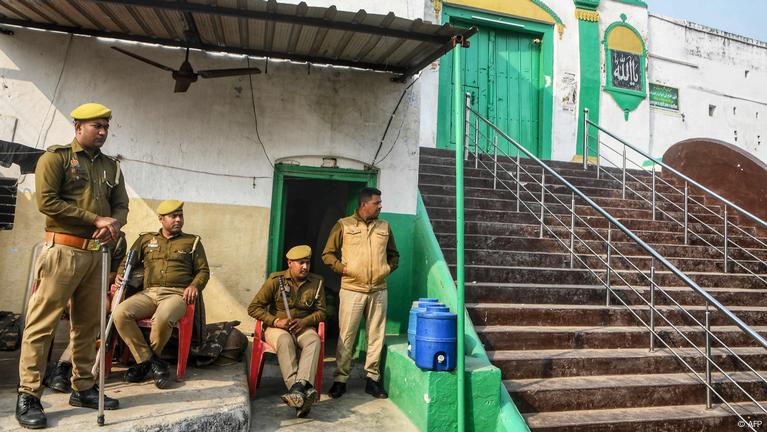By Irfan Engineer, Neha Dabhade, Mithila Raut
A prominent and increasingly concerning form of structural violence against the Muslim community in India is the reclamation of their places of worship, with claims that these sites were originally Hindu temples or locations of significance within Hindu mythology. The contestation over religious sites is not a novel phenomenon in India; rather, it has a historical precedent marked by conflicts over sacred places.
A notable example of this is the Ayodhya Ram Mandir dispute, which, although it culminated in a Supreme Court ruling that ended the legal battle, remains emblematic of the broader issues surrounding religious site disputes. However, in recent years, a more aggressive stance has emerged, from Hindu right-wing groups, which have increasingly asserted that numerous Muslim places of worship were originally Hindu temples. These groups have been filing legal petitions for archaeological surveys of such sites to uncover “evidence” of former temples beneath the existing religious structures.
The judiciary have, in some instances, ordered such surveys with the Archaeological Survey of India (ASI). Simultaneously, the judiciary has issued orders for the demolition of certain madrassas and mosques, further intensifying the sense of contested religious spaces. These developments reflect a broader pattern of religious contestation and the changing nature of sacred spaces in India.
According to data monitored by the Centre for Social Studies and Society (CSSS) from the Mumbai editions of five prominent newspapers—Times of India, Indian Express, The Hindu, Shahafat, and Inquilab—a total of twelve sites of Muslim worship were under contestation in 2024. These sites, primarily mosques and dargahs, have been claimed by right-wing groups to be former Hindu temples. Of these twelve sites, seven are located in Uttar Pradesh, while one each is situated in Maharashtra, Himachal Pradesh, Rajasthan, Delhi, and Madhya Pradesh. In six of these cases, parts of the mosques or dargahs have already been demolished. In the remaining cases, the judiciary has either ordered archaeological surveys or permitted the opening of these sites for Hindu worship, thereby altering the religious character of the places in question.
These ongoing disputes are likely to escalate further, particularly given the challenges currently being mounted against the Places of Worship (Special Provisions) Act of 1991. This legislation was introduced with the intention of preserving the character and identity of religious sites as they existed at the time of India’s independence in 1947. The Act prohibits the conversion or alteration of the character of any place of worship and bars courts from entertaining disputes regarding the status of such places, with a notable exception being the Babri Masjid case, which was specifically excluded from the Act’s provisions. However, multiple petitions have been filed challenging the constitutionality of this Act, effectively opening a Pandora’s box of further claims by the right-wing, which has fueled increased communal tensions and unrest in the country.
Moreover, the contestation of religious sites, particularly the demolition of mosques and the alteration of places of Muslim worship, signifies a significant obstruction to the practice of freedom of religion or belief for the Muslim community in India. These developments raise serious concerns about the erosion of constitutional safeguards and the growing political and social marginalization of religious minorities. As such, these disputes not only challenge the legal framework established to protect religious sites but also exacerbate the ongoing communal divides within Indian society
In Maharashtra in January 2024, a three decades old madrasa and a mosque were demolished by the Maharashtra’s government in Mumbai citing the need for road widening. The operation against Gulshan Ahmed Raza Madrasa and Masjid Tahira located in Mumbai’s Ghat Kopar-Andheri street was carried out amid strict police arrangements. This is the second instance in the city of early morning action against religious structures. The incident echoes a similar occurrence on December 28, when a shrine near Gandhi Maidan in Kurla (West) was demolished in the early hours, citing illegality. Mansoor Sheikh, trustee of the masjid and madrasa near Sarode Hospital, stressed that the masjid committee had obtained legalisation from the Mumbai Metropolitan Region Development Authority (MMRDA) during the Ghatkopar-Andheri Link Road widening project. The demolition has sparked outrage among the local Muslim community, questioning the legality of the action.
In Delhi on January 30, the Delhi Development Authority (DDA) razed the Akhoondji mosque and a madrasa, describing them as “illegal structures” in Sanjay Van, a reserved forest area (Kuntamalla, 2024). Ironically, the Mosque was built in Mehrauli centuries back and there are records of it being repaired in 1270.
In Himachal Pradesh, in Mandi town of Himachal Pradesh, the municipal corporation has claimed that a portion of a mosque is illegally built. There was a protest in the town by a mob demanding that the portion of the mosque which is illegal should be demolished. Police used water cannons on Friday September 13, 2024 to disperse protesters demanding the demolition of a portion of a mosque built on encroached government land in Himachal Pradesh’s Mandi town. Eight FIRs were registered after six police personnel, including a woman official, were injured. In Mandi, the mosque management committee were served a notice by the local municipal corporation to remove the encroachment within 30 days. According to the notice, the mosque stands on 232 square metres of land, while the approval granted was just for 45 square metres. Raising slogans of Jai Shree Ram, the protesters initially held a march in the Mandi market area and sat on a dharnaat Seri manch.
In Madhya Pradesh, after the High Court in Madhya Pradesh had directed the ASI to carry out a survey at the Bhojshala Temple-Kamal Maula Mosque Complex, the ASI carried out its scientific survey. The report has claimed that the existing structure at the Bhojshala complex in Madhya Pradesh’s Dhar district was constructed using remains of a temple that existed earlier at the site (Mishra &Malpani, 2024). The plaintiff claims that Bhojshala, an 11th-century monument, was a temple of Vagdevi (Goddess Saraswati), while the Muslims state that it is Kamal Maula mosque. For the last 21 years, Hindus are allowed to worship in the Bhojshala on Tuesdays, while Muslims are allowed to offer namaz at the place on Fridays.
In Uttar Pradesh, a court in Baghpat, ordered the demolition of a 60-year-old mosque that was allegedly “constructed on encroached pond land” in the Baraut area. It also imposed a Rs 4.2 lakh fine on the mosque’s trustee. The order came after a directive from the Allahabad high court mandating resolution of the matter within a 90-day period.
A district court in Lucknow rejected on February 28, 2024 a revision petition filed by the Muslim side against a civil judge order whereby he had decided, on September 6, 2023, to hear civil suit in TeeleWali Masjid case after rejecting plea that the suit cannot be heard on grounds of non-maintainability. The civil suit was filed in 2013, contending that during Mughal emperor Aurangzeb’s reign, a Hindu religious structure, Laxman Teela, was demolished to make way for Teele Wali mosque, and, therefore, the original Hindu religious structure must be restored at the site.
In his order, additional district judge said plea in the civil suit was based on a mixed question of law and facts and hence could not be dismissed summarily without recording evidence only on objection of Muslim side that the suit was time-barred under provisions of the Places of Worship Act, 1991. ADJ observed that there was no illegality in the order of Sept 6, 2023 in entertaining the suit on merit. Plaintiff that said the suit was not maintainable not only under the Places of Worship Act, 1991, but was also barred by provisions of Waqf Act, 1995. The civil judge had rejected the Muslim side’s objection, leading to a revision plea before ADJ. (TOI, 2024)
Allahabad high court on 1st August, 2024 upheld the maintainability of a bunch of suits seeking “removal” of the ShahiIdgah mosque adjacent to the Krishna Janmabhoomi temple in Mathura. The petitions claim that the Aurangazeb-era mosque was built after the demolition of a temple that marked the spot where Lord Krishna was born.
16th century mosque of the Mughal era, the Jama Masjid in Sambhal, Uttar Pradesh is claimed to be a temple. Following a petition filed in the court of the civil judge at Sambhal, a survey was carried out on November 19, 2024 evening in the presence of the local police and members of the mosque’s management committee. The court directed survey was carried out without hours of the directive under the supervision of the District Magistrate and the Superintendent of Police. The survey was protested by locals. The police resorted to firing in response and killed five individuals. There are many more such instances in Uttar Pradesh. (IPA Service)

 US-Saudi Arabia To Ink The Biggest Arms Deal Valued At $100 Billion
US-Saudi Arabia To Ink The Biggest Arms Deal Valued At $100 Billion 